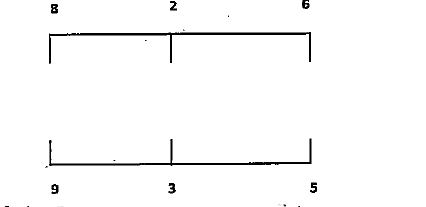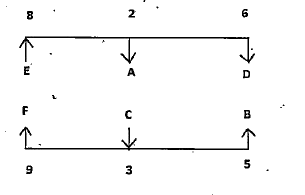Six persons A, B, C, D, E and F are sitting on six chairs which are arranged in two parallel rows in a rectangular formation equidistant from each other. They are either facing North or South Direction. The persons with even number of toys are sitting on the chairs which are to the North of the person with odd number of toys. They have different number of toys as shown in the figure below.

E is not facing B or F.A pair of two immediate neighbors are facing the same direction. Both the immediate neighbors of C are facing the same direction. The person sitting ahead of F has even number of toys. The Person who is facing B is an immediate neighbour of A. C is not facing the person having an even number of toys. Person sitting in front of A has less than 9 toys. There is a difference of two between the number of toys of B and C.
Who is sitting diagonally opposite to B?
The one who has nine toys
The one who has six toys
F
E
The correct Answer is:D
Step 1. From the information given in the question we have, There is a difference of two between the number of toys of B and C. It means B and Care either sitting on chairs with 8 and 6 toys or on the chairs with 3 and 5 toys. Both the immediate neighbors of C are facing the same direction. It means Chas two immediate neighbors so C must be sitting on the chair with three toys while B must be sitting on the chair with 5 toys. The person sitting ahead of F has even number of toys. It means F has 9 toys. C is not facing the person with even number of toys therefore C must be facing south. Person facing B is an immediate neighbour of A and F and B are facing to north as because both the immediate neighbours of C face to same direction and B faces to north. It means A has two toys. Person sitting in front of A has less than 9 toys, Word front suggest A is facing towards South. E is not facing B or F. It means E is facing towards North. A pair.of two immediate neighbors are facing the same direction. It means A and D are facing towards south.
So we have our final solution as

Similar Questions
एक पासा फेंका जाता है। मान लीजिए घटना E ‘पासे पर संख्या 4 दर्शाता है और घटना F 'पासे पर सम संख्या दर्शाता है। क्या E और F परस्पर अपवर्जी हैं ?
View SolutionNa तथा Mg क्रमश: bcc तथा fcc के रूप में क्रिस्ट्लित होते हैं तब Na तथा Mg की उनकी इकाई सेलो में परमाणुओं की संख्या क्रमश: होगी :
View SolutionA तथा B धातु युक्त द्विअंगी मिश्रधातु के इकाई सेल की ccp संरचना है जिसमे A परमाणु कोनो पर तथा B परमाणु घन के प्रत्येक फलक के केंद्र पर स्थित होते है । यदि इस मिश्रधातु के क्रिस्टलीकृत के दौरान, इकाई सेल में दो A परमाणु लुप्त हो जाते हैं, तब प्रति इकाई सेल का पूर्ण संघटन होगा :
View Solutionसमान चालकता सेल में लिए गए दो विलयनों A तथा B के प्रतिरोध क्रमशः 50 ओम तथा 100 ओम है । यदि A व B के सामान आयतन मिला दिए जाये तो सामान चालकता सेल में मिश्रण का प्रतिरोध क्या होगा ?
(मोल A व B को मिलाने पर वियोजन की मात्रा में कोई परिवर्तन नहीं होता है)
View Solutionकिसी घोल का अणुसंख्यक गुणधर्म आधारित है-
View Solutionछलकता सेल में इलेक्ट्रोड सूक्षम विभाजित प्लेटिनक ब्लेक की परत से आवृत करते है, क्यू ?
View Solutionक्या आप दस पुनर्योगज प्रोटीन के बारे में बता सकते हैं जो चिकित्सीय व्यवहार के काम में लाये जाते हैं ? पता लगाइये कि वे चिकित्सीय औषधि के रुप में कहाँ प्रयोग किए जाते हैं ?
View Solutionठण्डे वाताबरण में रहने वाले स्तनधारियों के कान व पैर छोटे होते है । यह किस नियम की पूर्ति करते है।
View Solution
